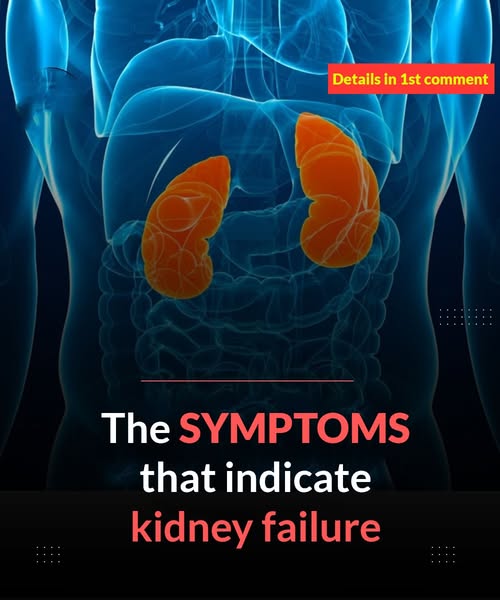The first SYMPTOMS that warn of kidney failure, DO NOT ignore them!

Are you concerned that your kidneys might be failing? Many individuals overlook potential signs of kidney dysfunction because early symptoms can be subtle or easily confused with other health issues. However, understanding the critical role your kidneys play in overall health is essential. Although relatively small, the kidneys are among the most vital organs in the body. They filter approximately half a cup of blood every minute, efficiently removing waste and excess fluids to produce urine. This remarkable process is fundamental to maintaining a delicate balance of electrolytes in your nerves, muscles, and other tissues.
Beyond waste elimination, the kidneys perform several other essential functions. They help regulate blood pressure, contribute to red blood cell production by releasing the hormone erythropoietin, and play a role in maintaining bone health through the regulation of minerals such as calcium and phosphorus. Given these responsibilities, any significant decline in kidney function can have widespread effects on your body’s systems.
Kidney disease can manifest in various forms, ranging from kidney stones and infections to more severe conditions such as kidney cancer and, ultimately, kidney failure. Numerous risk factors—such as diabetes, hypertension, smoking, obesity, and an unhealthy diet—can increase your likelihood of developing kidney problems. Among these conditions, kidney failure is particularly concerning because it signifies that the kidneys are no longer capable of performing their critical functions adequately.
Experts define kidney failure as the point at which the kidneys can no longer maintain homeostasis, leading to the accumulation of toxins and imbalances in the body. This condition may also pave the way for other health issues, including worsening hypertension, anemia, and deficiencies in bone mineral density. Consequently, early detection and prompt intervention are paramount to slowing the progression of the disease and preventing further complications.
As kidney function declines, a number of clinical symptoms may become apparent. Patients may experience noticeable swelling in the legs, feet, or ankles due to fluid retention. Headaches, fatigue, and persistent itching can also be early indicators of kidney dysfunction. Gastrointestinal disturbances, such as stomach upset, and changes in the sense of taste—where food no longer tastes as it once did—are further signs that should not be ignored. Muscle cramps, pain, numbness, or stiffness can occur, all of which may point to underlying issues with kidney performance.
The most concerning and universally recognized symptom of kidney failure is a significant reduction in urine output. If you notice that you are urinating much less than usual, or if you are not urinating at all, this is a critical sign that warrants immediate medical attention.
Given the potentially rapid progression of kidney failure, it is imperative that you seek medical advice if you experience three or more of these symptoms. Even if only a single symptom—such as a marked decrease in urination—is present, prompt consultation with your primary care physician is essential. Your doctor can perform initial assessments and, if necessary, refer you to a nephrologist for a more detailed evaluation, including blood tests and imaging studies.
Early diagnosis is crucial in managing kidney disease. Timely treatment can slow disease progression, improve quality of life, and reduce the risk of complications. Preventative measures, such as maintaining a healthy diet, staying well-hydrated, and controlling blood sugar and blood pressure levels, are also important in reducing the risk of kidney damage.
In summary, while the symptoms of kidney failure can be misleading and may mimic other common ailments, paying close attention to signs such as swelling, fatigue, changes in taste, and reduced urine output can be lifesaving. An informed and proactive approach to your health is the best defense against the potential progression of kidney disease. If you suspect that your kidney function is compromised, do not hesitate to seek professional medical advice. Early intervention is key to protecting your health and ensuring that any necessary treatment is administered as swiftly as possible.